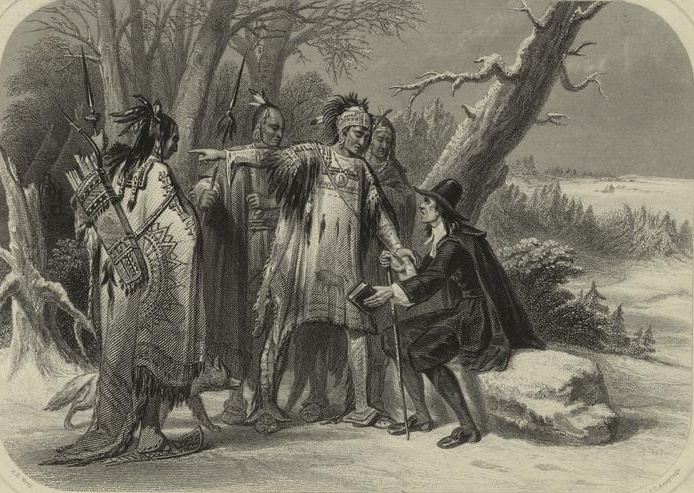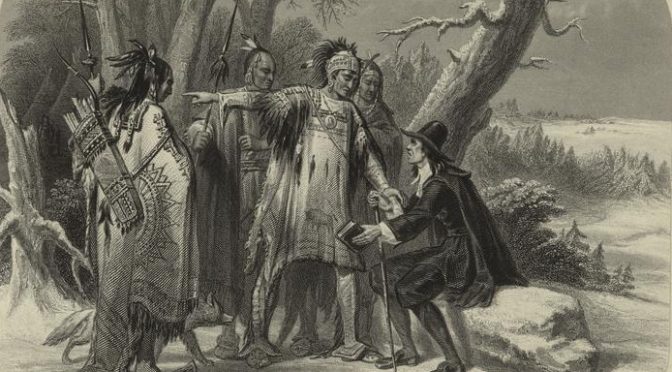It is now well established that the Basques, if not the very first Europeans to set foot on the North American continent, were among the first. Of course, there were already a large number of thriving peoples living there when they arrived, and the Basques certainly interacted closely with them, even developing trading pidgins. None of the words commonly used by the various visitors to identify and distinguish the different tribes were what those people used to call themselves. Rather, they came from a variety of sources, most of which are lost today. Peter Bakker has argued in one of his papers that several of those names may have a Basque origin. While it is near impossible to definitively prove these possible links, they do provide a new perspective on their possible origin.

- Iroquois: The Iroquois, or the Haudenosaunee as they call themselves, lived in the North American northeast. The first record of the word Iroquois comes from 17th century French documents. When the French first landed on the continent and interacted with the native peoples, they found them speaking a Basque-Mi’kmaq pidgin in which the Mi’kmaq called their neighbors the Iroquois. While many etymologies of the word have been proposed, Bakker suggests it comes from the negative attitudes the Mi’kmaq had of their neighbors and derives from the Basque word hil with the suffix koa, or hil-koa, meaning “killer people.”
- Tarrantine: The Tarrantine were a Mi’kmaq tribe living in what is now northern New England. The name Tarrantine has been proposed to come from the Basque tarantari, meaning “babbler, chatterer,” though other origins have also been proposed.
- Etchemin: This one seems so obviously Basque – it has the word etxe in it – but even so, its origin is not so certain. The Etchemin language is part of the Algonquin language family and some derive the word Etchemin from a French modification of the Algonquin words for canoe, or the native word used for another local tribe. They were first mentioned in 1603 by Samuel de Champlain. His scout noted that these people lived in long houses, as opposed to their more southern neighbors. Bakker suggests that the word might come from the Basque words for house and pine, indicating their houses were built from pine trees, with the ‘p’ being changed to ‘m’ for unknown (though seemingly common) reasons. Thus, he suggests Etchemin comes from etxe-pinu, meaning “houses of pine.”
- Algonquin: The Algonquin languages, which are a branch of the much larger Algonquian language family, is spoken by the Algonquin First Nations of Quebec and Ontario. The first record of the word Algonquin comes again from Champlain in 1603 in the form of Algoumequin. Bakker notes the similarity of this word to the Basque arkumeki, meaning “lamb meat.” Why anyone would name a group of people after meat Bakker is at a loss to explain, except that trading meat was common in relationships between the Native peoples and European traders. He admits this is a rather challenging etymology.
- Bakker also notes that there are several other names used to denote the geographical origin of a given people that end in the suffix quois, which suggests to him a strong connection to the Basque koa. These include Canadaquois (someone from Canada and very similar to modern Basque Kanadakoa), Samaricois (a Breton, from sanmalo-koa, named after Saint Malo port in Brittany), and Gasptiquois (someone from the Gaspe area, or Mi’kmaq). He goes into a few of these in more detail.
- Souriquois, another name for the Mi’kmaq, comes from the Souricoua River (which itself could be Basque, coming from zuri (white) and koa).
- Armouchiquois seems to come from the Mi’kmaq word lmu:s or lmu:j, meaning dog, and the Basque suffix koa, meaning “dog people.”
- Charioquois is an early word used for the Wyandot people (also called the Hurons). While the suffix koa appears again, it isn’t clear what the root of this word means. Bakker suggests a few possibilities, but none are very definite.
Primary source: P. Bakker, Amerindian Tribal Names in North America of Possible Basque Origin, in X. Artiagoitia, R. P. G. De Rijk, P. Goenaga, & J. Lakarra (Eds.), Erramu boneta: Festschrift for Rudolf P.G. de Rijk. Anejos del Anuario del Seminario de Filología Vasca Julio de Urquijo (pp. 105–116). Bilbao: Universidad del País Vasco.


